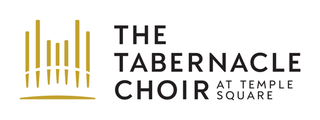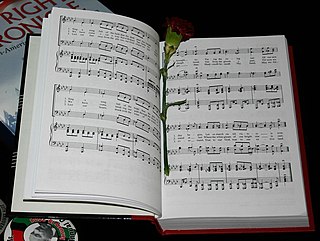
TheTabernacle Choir at Temple Square, formerly known as the Mormon Tabernacle Choir, is an American choir, acting as part of The Church of Jesus Christ of Latter-day Saints. It has performed in the Salt Lake Tabernacle for over 100 years. The Tabernacle houses an organ, consisting of 11,623 pipes, which usually accompanies the choir.

The "Battle Hymn of the Republic", also known as "Mine Eyes Have Seen the Glory" or "Glory, Glory Hallelujah" outside of the United States, is a popular American patriotic song written by the abolitionist writer Julia Ward Howe.

"Lift Every Voice and Sing" is a hymn with lyrics by James Weldon Johnson (1871–1938) and set to music by his brother, J. Rosamond Johnson (1873–1954). Written from the context of African Americans in the late 19th century, the hymn is a prayer of thanksgiving as well as a prayer for faithfulness and freedom, with imagery which evokes the biblical Exodus from slavery to the freedom of the "promised land."
Mormon folk music is primarily composed of folk music which was sung by Mormon pioneers in present-day Utah from the mid-19th century through the early 20th century. A notable historical component of Utah music, the popularity of Mormon folk music declined along with traditional music nationally after the advent of music recording. However, the popularity of uniquely Mormon folk music had already begun its decline before the end of the 19th century. Mormon folk songs generally showcase pioneer-era Mormon unity and communal values.

Music & the Spoken Word is a religious radio and television series. Broadcast weekly from the Salt Lake Tabernacle in Salt Lake City, Utah, the program primarily features performances of music by The Tabernacle Choir at Temple Square—often accompanied by the Salt Lake Tabernacle organ and the Orchestra at Temple Square, accompanied by spiritual messages and passages related to a specific episode's theme.

Sign singing or Karaoke signing is singing using sign language. Typically a song is played, and the performer expressively performs a sign language version of the lyrics. Whereas vocal singing uses pitch and tone to convey expressions, sign singing relies on the performer's hands, body, and facial expressions.

On June 5, 2004, Ronald Reagan, the 40th president of the United States, died after having Alzheimer's disease for nearly a decade. Reagan was the first former U.S. president to die in 10 years since Richard Nixon in 1994. At the age of 93 years, 120 days, Reagan was the longest-lived U.S. president in history at the time of his death, a record which was surpassed by Gerald Ford on November 12, 2006. His seven-day state funeral followed. After Reagan's death, his body was taken from his Bel Air home to the Kingsley and Gates Funeral Home in Santa Monica, California, to prepare the body for burial. On June 7, Reagan's casket was transported by hearse and displayed at the Ronald Reagan Presidential Library in Simi Valley, California, then flown to Washington, D.C., on June 9 for a service, public viewing and tributes at the U.S. Capitol.

Mack J. Wilberg is an American composer, arranger, conductor, and choral clinician who has been the music director of the Tabernacle Choir at Temple Square (Choir) since 2008.

Janice Kapp Perry is an American composer, songwriter, and author. As a member of The Church of Jesus Christ of Latter-day Saints, she has written over 3,000 songs, some of which appeared in the church's official hymnal, and in the Children's Songbook. Some of her most well-known songs include "I Love to See the Temple" and "A Child's Prayer".
Jerold Don Ottley was an American music director and choral conductor. He served as the director of the Mormon Tabernacle Choir (Choir) from 1974 to 1999. During his tenure, he established the Choir's annual Christmas concert and appointed its first female organist. Prior to that, he was assistant chair of the University of Utah's Music Department.

Evan Stephens was a Latter-day Saint composer and hymn writer. He was also the director of the Mormon Tabernacle Choir for 26 years (1890–1916).

Joseph Spencer Cornwall was a conductor of the Mormon Tabernacle Choir in the mid-20th century.
The choirs at Brigham Young University (BYU) consist of four auditioned groups: BYU Singers, BYU Concert Choir, BYU Men's Chorus, and BYU Women's Chorus. Each choir is highly accomplished and performs from an extensive repertoire. Together, the choirs have recorded and released over 30 albums. The choirs perform frequently throughout the academic year, both as individual ensembles as well as a combined group.
The Mormon Youth Symphony and Chorus (MYSC) was an official musical organization of The Church of Jesus Christ of Latter-day Saints from 1969 to 1999, composed of young musicians aged 18 to 33. In its 30-year history, MYSC was credited with many television specials, numerous recordings, concerts, and several major tours throughout the United States. The group was disbanded during the 1999 reorganization of the Tabernacle Choir and resulting creation of the Orchestra at Temple Square. The choral arm of the group provided music for the church's annual and semi-annual general conferences, usually during the Saturday morning sessions.

Ebenezer Beesley was a Latter-day Saint hymn writer and composer. The music for twelve of the hymns in the 1985 English-language hymnal of The Church of Jesus Christ of Latter-day Saints were written by him.
Susan Evans McCloud is an American novelist, author, poet, hymnwriter, and member of The Church of Jesus Christ of Latter-day Saints.
Alex Boyé is a British-American singer, dancer, and actor. He was named the "2017 Rising Artist of the Year" in a contest sponsored by Pepsi and Hard Rock Cafe.

The opening ceremony of the 2002 Winter Olympics took place at the Rice-Eccles Olympic Stadium in Salt Lake City, Utah, United States, on 8 February 2002.
The Portland Choir & Orchestra is a non-profit musical organization that consists of 120 volunteer singers and 45 musicians from the Portland, Oregon metropolitan area. Many members travel up to 100 miles to participate in rehearsals and performances.












